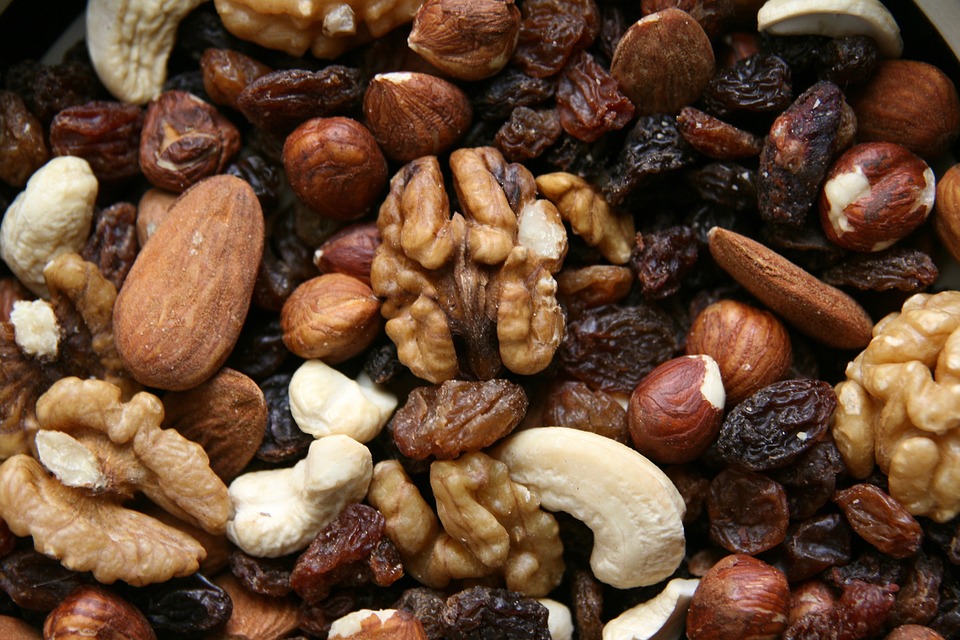Healthy nuts and oilseeds are not only a perfect munch option, but also brimming with goodness of nutrients. They are filled with anti-oxidants and anti-inflammatory properties. Let’s try to get a better understanding of nuts and oilseeds commonly available in India.
Understanding Nuts and Oilseeds:
What are Nuts and Oilseeds?
Nuts are rich sources of unsaturated fatty acids, protein, fiber, minerals (eg, magnesium, potassium, and zinc). They are also rich in vitamin E, folate. Also, rich in other bioactive compounds. For instance, phenolics and phytosterols. And so are oil seeds.
There are a variety of nuts and oilseeds available in India. Moreover, you will be surprised to know that different regions of India, have different names for these nuts and seeds.
Healthy Nuts & Oil seeds and Fats:
What is the relationship between healthy nuts & oilseeds and fats?
When we think about nuts and oilseeds, the first thing that comes to our mind is fats. It is true that they are rich in fats. But whenever you consume fats, not only the quality but also the number of fats are the factors that matter the most. In the case of nuts and oilseeds, though they are rich sources of fats. But the fats they are rich in are healthy fats. For instance, unsaturated fatty acids, which are monounsaturated fatty acids and poly-unsaturated fatty acids.
Any food item, rich in saturated fatty acids and trans fats is not healthy for your consumption. Furthermore, if the fat break-up shows a significant amount of unsaturated fatty acids, you can think to choose that food item.
Coming back to nuts and oilseeds, they are not only rich in unsaturated fatty acids, but also rich in protein, fiber, and anti-oxidants. Anti-oxidants are compounds that help to neutralize free radicals in our bodies.
There are many types of research that support the fact, that nut consumption has beneficial effects. Such as on heart health, on improving lipid profiles. And reducing the risk of weight gain and having anti-inflammatory and antioxidant properties. So, nuts are healthy and should be consumed daily.
What is the nutrient content of Nuts?
Healthy Nuts & oilseeds and the nutrients present in them:
Nuts are not only energy but also nutrient-dense foods. They are one of the natural plant foods richest in fat after vegetable oils. However, the fatty acid composition of nuts is beneficial.
Because the saturated fatty acid (SFA) content is low (4–16%). And nearly half of the total fat content is made up of unsaturated fat. That is, monounsaturated fatty acids MUFA (oleic acid) and polyunsaturated fatty acids (PUFA) in most nuts.
Nuts and bioactive compounds:
Nuts are also rich sources of other bioactive macronutrients. That has the potential to beneficially affect metabolic and cardiovascular outcomes. They are an excellent source of protein (approximately 25% of energy).
And often have a high content of L-arginine. Nuts also are a good source of dietary fiber, which ranges from 4 to 11 g per 100 g. And in standard servings provide 5–10% of daily fiber requirements.
What should be the serving size of nuts?
Eating in moderation is always the key. And therefore, you should not eat excessive amounts of nuts, thinking that they are super healthy. Having nuts in regulation, with 1-2 servings of mixed nuts per day is considered to be beneficial. 1 serving of nuts according to Indian recommendation refers to 8-12g of nuts. And therefore, if you tend to take 2 servings of nuts, you should go for 16-24g of nuts. It’s usually best to take mixed nuts, or you can also take nuts according to your preferences.
| Moisture(g) | Protein(g) | Total Fat(g) | Dietary Fibre Total(g) | Insoluble(g) | Soluble(g) | Carbohydrate(g) | Energy (kcal) | |
| Food Name | WATER | PROTCNT | FATCE | FIBTG | FIBINS | FIBSOL | CHOAVLDF | ENERGY |
| Almond | 4.37+0.31 | 18.41+0.04 | 58.49+0.04 | 13.060.31 | 10.55+0.22 | 2.52+0.34 | 3.04+0.24 | 2549+4 |
| Arecanut, dried, brown | 6.63+0.15 | 5.78+0.45 | 4.35+0.03 | 11.44+0.64 | 10.14+0.44 | 1.30+0.32 | 70.42+0.81 | 1467+12 |
| Arecanut, dried, red | 6.300.32 | 6.46+0.51 | 4.46+0.03 | 11.11+0.34 | 10.090.25 | 1.030.27 | 70.27+0.96 | 1477+9 |
| Arecanut, fresh | 37.70 | 2.73 | 5.51 | 7.63 | 6.59 | 1.03 | 45.00 | 1024 |
| Cashew nut | 4.44+0.22 | 18.78+0.58 | 45.200.07 | 3.86+0.47 | 2.23+0.35 | 1.630.24 | 25.46+0.70 | 2438+11 |
| Coconut, Kernal, dry | 3.97+0.73 | 7.27+0.02 | 63.26±0.30 | 15.88±0.79 | 14.55+0.23 | 1.330.99 | 8.01+1.02 | 2611+9 |
| Coconut, kernel, fresh | 36.14+0.36 | 3.84+0.04 | 41.38+0.42 | 10.42+0.28 | 9.43+0.24 | 0.99±0.07 | 6.300.43 | 1711+13 |
| Garden cress, seeds | 4.600.21 | 23.360.32 | 23.74+0.09 | 8.27+0.04 | 6.330.06 | 1.95+0.10 | 33.66+0.50 | 18633 |
| Gingelly seeds, black | 4.51+0.44 | 19.17+0.64 | 43.10+0.03 | 17.16+0.19 | 13.57+0.13 | 3.59+0.13 | 10.29+0.74 | 2124+8 |
| Gingelly seeds, brown | 3.620.32 | 21.61+0.71 | 43.220.08 | 17.21+0.18 | 13.580.18 | 3.630.11 | 9.761.01 | 2161+8 |
| Gingelly seeds, white | 3.300.28 | 21.70+0.44 | 43.05+0.04 | 16.99+0.30 | 13.49+0.19 | 3.51+0.15 | 10.83+0.50 | 2174+9 |
| Groundnut | 6.97+0.69 | 23.65+0.85 | 39.630.29 | 10.380.18 | 8.580.15 | 1.79+0.22 | 17.27+0.33 | 2176+9 |
| Mustard seeds | 5.67+0.48 | 19.51+0.23 | 40.19+0.21 | 14.100.66 | 10.63+0.57 | 3.47+0.20 | 16.80+0.71 | 2132+16 |
| Linseeds | 5.48+0.28 | 18.55+0.15 | 35.67+0.70 | 26.17+0.39 | 21.830.60 | 4.330.84 | 10.99+0.86 | 1857+16 |
| Niger seeds, black | 4.65+0.59 | 18.92+1.61 | 38.61+0.41 | 10.93±0.05 | 10.500.03 | 0.43+0.04 | 22.982.64 | 2144+11 |
| Niger seeds, gray | 5.660.29 | 18.34+2.11 | 39.530.26 | 10.960.14 | 10.54+0.12 | 0.41+0.03 | 20.591.85 | 2128+6 |
| Pine seed | 5.32+0.15 | 12.55+0.25 | 48.79+0.10 | 3.79+0.03 | 2.23+0.03 | 1.57+0.03 | 26.77+0.35 | 2486+3 |
| Pistachio nuts | 4.680.22 | 23.35+0.35 | 42.49+0.34 | 10.64+0.16 | 8.230.15 | 2.41+0.11 | 15.820.52 | 2257+10 |
| Safflower seeds | 5.24+0.16 | 17.66+0.54 | 30.87+0.98 | 13.49+0.45 | 10.24+0.27 | 3.25+0.22 | 30.18±1.20 | 1981+20 |
| Sunflower seeds | 3.530.29 | 23.53+0.56 | 51.85+0.07 | 10.800.13 | 8.51+0.17 | 2.29+0.07 | 6.85+0.99 | 2453±8 |
| Walnut | 3.56+0.22 | 14.92+0.62 | 64.27+0.05 | 5.39+0.19 | 4.74+0.17 | 0.65+0.03 | 10.14+0.69 | 2809+3 |
| Aluminum | Arsenic | Cadmium | Calcium | Chromium | Cobalt | Copper | Iron | Lead | Lithium | |
| mg | pg | mg | mg | mg | mg | mg | mg | mg | mg | |
| Food Name | AL | AS | CD | CA | CR | CO | CU | FE | PB | LI |
| Almond | 0.88+0.32 | 228+10.2 | 0.006:0.003 | 0.007+0.002 | 1.08+0.06 | 4.59+0.61 | 0.002+0.002 | 0.001+0.001 | ||
| Arecanut, dried, brown | 1.68+0.97 | 61+13.25 | 0.045+0.020 | 0.003:0.003 | 1.27+0.29 | 2.74:0.71 | 0.008:0.006 | 0.004+0.003 | ||
| Arecanut, dried, red | 1.05+0.33 | 0.001+0.000 | 51:11.33 | 0.029+0.016 | 0.002+0.001 | 1.57+0.59 | 3.26+0.90 | 0.005+0.003 | 0.002+0.000 | |
| Arecanut, fresh | 34.03 | 0.71 | 1.04 | |||||||
| Cashew nut | 0.18:0.11 | 34:2.98 | 0.002+0.001 | 0.004:00.001 | 2.23+0.13 | 5.95+0.44 | 0.005+0.004 | |||
| Coconut, Kernal, dry | 0.41+0.05 | 0.001+0.000 | 32+4.51 | 0.013+0.012 | 0.006:0.003 | 0.90+0.11 | 3.13:0.47 | 0.006+0.003 | 0.004+0.003 | |
| Coconut kernel, fresh | 0.03:0.01 | 0.001+0.000 | 8:1.42 | 0.003+0.002 | 0.004:00.002 | 0.36+0.19 | 1.30+0.51 | 0.002+0.000 | ||
| Garden cress, seeds | 11.01+10.33 | 0.008+0.003 | 318:54.8 | 0.019:0.010 | 0.51+0.09 | 17.20+5.49 | 0.042+0.029 | |||
| Gingelly seeds, black | 2.08+0.32 | 0.004+0.002 | 1664+329 | 0.029+0.014 | 0.035:0.013 | 1.76:0.24 | 13.90+1.60 | 0.034+0.017 | 0.035e0.019 | |
| Gingelly seeds, brown | 2.50+0.69 | 0.001+0.001 | 1174+189 | 0.020+0.009 | 0.022+0.011 | 1.68+0.18 | 14.95+1.69 | 0.010+0.011 | 0.004+0.003 | |
| Gingelly seeds, white | 1.29+0.43 | 1283+149 | 0.015+0.006 | 0.023.00.026 | 1.50+0.12 | 15.04+2.09 | 0.024+0.017 | 0.005+0.003 | ||
| Groundnut | 3.16:0.39 | 0.002+0.001 | 54+7.37 | 0.007+0.002 | 0.009:0.003 | 0.92+0.08 | 3.44+0.36 | 0.003+0.002 | 0.002+0.002 | |
| Mustard seeds | 7.78+1.60 | 5.84+1.58 | 0.004+0.002 | 402+54.0 | 0.027+0.018 | 0.019:0.010 | 0.69+0.15 | 13.49+2.95 | 0.008+0.004 | 0.016+0.016 |
| Linseeds | 8.25:3.18 | 0.009+0.002 | 257+14.0 | 0.001+0.000 | 0.033.00.014 | 1.34+0.09 | 5.44+0.69 | 0.004+0.002 | ||
| Niger seeds, black | 11.94+3.46 | 3.35+0.16 | 0.001+0.001 | 572+37.1 | 0.029+0.019 | 0.011+0.004 | 1.20+0.04 | 8.19:0.22 | 0.004+0.003 | 0.037+0.035 |
| Niger seeds, gray | 13.84+2.87 | 3.02+0.38 | 0.004+0.006 | 375+58.1 | 0.046+0.022 | 0.017:00.005 | 1.37+0.15 | 19.61:5.77 | 0.008+0.008 | 0.024+0.020 |
| Pine seed | 7.00+1.48 | 0.004+0.001 | 17:1.27 | 0.002+0.001 | 0.001:0.001 | 1.17+0.07 | 4.50+1.03 | 0.004+0.002 | ||
| Pistachio nuts | 3.09+0.56 | 0.001+0.000 | 135+22.4 | 0.003.0.004 | 0.001:00.000 | 0.89+0.05 | 4.50+0.63 | 0.014+0.007 | ||
| Safflower seeds | 1.19:0.21 | 0.005+0.002 | 211+14.5 | 0.003.0.002 | 0.003:0.001 | 0.56:0.13 | 4.06:0.42 | 0.032+0.044 | ||
| Sunflower seeds | 1.33+0.51 | 0.005+0.000 | 176+27.0 | 0.009+0.002 | 0.021+0.001 | 278+0.99 | 5.85+1.09 | 0.009+0.003 | 0.006+0.000 | |
| Walnut | 0.37+0.15 | 0.46:0.52 | 105+5.9 | 0.006+0.007 | 0.009:0.003 | 1.52+0.33 | 3.21+0.17 | 0.015+0.012 |
| Magnesium | Manganese | Mercury | Molebdeum | Nickel | Phosphorus | Potassium | Selenium | Sodium | Zinc | |
| mg | mg | pg | mg | mg | mg | mg | pg | mg | mg | |
| Food Name | MG | MN | HG | MO | NI | P | K | SE | NA | ZN |
| Almond | 318:49.5 | 2.54+0.20 | 0.033.0.012 | 0.130+0.027 | 446+23.2 | 699+43.4 | 3.61:1.30 | 1.50+0.51 | 3.50+0.10 | |
| Arecanut, dried, brown | 76.39+17.49 | 2.14+0.75 | 0.005+0.003 | 0.111:0.057 | 105+8.3 | 524+43.4 | 15.21:4.09 | 12.06:1.47 | 0.89+0.11 | |
| Arecanut, dried, red | 91.01+14.45 | 2.32+0.84 | 0.022+0.036 | 0.104+0.019 | 127+3.4 | 25.80 | 12.52+1.56 | 17.13:2.81 | 1.02+0.20 | |
| Arecanut, fresh | 47.60 | 1.36 | 90.48 | 329.00 | 5.53 | 0.56 | ||||
| Cashew nut | 307+46.6 | 1.78:0.08 | 0.025e0.011 | 0.607+0.145 | 500+35.3 | 635+35.2 | 13.08:1.07 | 9.00+0.19 | 5.34+0.27 | |
| Coconut, kernal, dry | 97.21+14.66 | 1.61:0.40 | 2.10:0.65 | 0.025+0.013 | 0.282+0.098 | 203+6.0 | 739262.00 | 25.25:2.78 | 16.68:0.38 | 1.41+0.11 |
| Coconut, kernel, fresh | 35:11.30 | 0.74:0.15 | 0.012+0.008 | 0.050+0.025 | 67.73+15.15 | 246:81.2 | 8.12+2.48 | 0.58:0.16 | ||
| Garden cress, seeds | 307+11.9 | 2.87+0.35 | 0.033+0.007 | 0.128.0.045 | 539+50.7 | 952+41.7 | 54.41:4.38 | 21.84:3.57 | 4.83+0.97 | |
| Gingelly seeds, black | 390+53.1 | 2.53:0.32 | 0.075+0.021 | 0.262+0.100 | 568+96.4 | 480+8.7 | 15.70+1.67 | 15.91:0.56 | 8.59+0.69 | |
| Gingelly seeds, brown | 328+13.3 | 1.76:0.19 | 0.114+0.029 | 0.113+0.030 | 613+86.8 | 491+7.5 | 52.64:8.89 | 11.94:0.17 | 7.84+0.93 | |
| Gingelly seeds, white | 372+39.9 | 1.74:0.15 | 0.126+0.036 | 0.116+0.039 | 754+42.6 | 460+38.9 | 26.74+2.78 | 15.43:0.70 | 7.7720.67 | |
| Ground nut | 197+15.5 | 1.62+0.07 | 1.37+0.00 | 0.108+0.024 | 0.174+0.065 | 391+13.0 | 679+48.9 | 3.41+0.74 | 12.21:0.47 | 3.18:0.14 |
| Mustard seeds | 266+47.3 | 4.23+1.18 | 0.028+0.010 | 0.076+0.036 | 715:82.1 | 28.99 | 71.47:15.33 | 3.97+1.01 | 4.03:0.26 | |
| Linseeds | 349+19.8 | 2.14+0.23 | 0.022+0.009 | 0.171+0.052 | 445:20.1 | 655+45.6 | 46.87+9.22 | 32.93:6.45 | 4.86+0.25 | |
| Niger seeds, black | 346+41.0 | 3.08:0.19 | 0.030+0.018 | 0.25720.036 | 461+9.5 | 716:70.6 | 39.31:5.41 | 10.70:1.79 | 4.98+0.77 | |
| Niger seeds, gray | 379:69.3 | 4.44+0.14 | 0.048:0.026 | 0.293+0.104 | 474+93.5 | 874+11.4 | 153.64+5.52 | 8.08+0.18 | 3.62+0.82 | |
| Pine seed | 268+18.7 | 7.92+0.55 | 0.033.0.021 | 0.191+0.045 | 618:39.7 | 686+69.0 | 10.56+4.93 | 1.31:0.04 | 4.18:0.04 | |
| Pistachio nuts | 149+3.0 | 0.87+0.06 | 0.65+0.33 | 0.022+0.003 | 0.087+0.009 | 537+9.2 | 1053+11.7 | 10.46:2.65 | 6.93+1.84 | 2.42+0.14 |
| Safflower seeds | 321+49.5 | 0.56:0.81 | 0.36+0.10 | 0.020+0.010 | 0.053+0.016 | 644+56.5 | 550+64.3 | 6.33+1.14 | 3.05:0.91 | 3.90:0.76 |
| Sunflower seeds | 413:33.5 | 2.35:0.91 | 0.047+0.020 | 0.322+0.144 | 752+118 | 559+8.0 | 1.90+0.44 | 7.07+0.52 | ||
| Walnut | 180+16.2 | 3.47+0.32 | 0.020+0.006 | 0.300+0.079 | 400+43.0 | 457+33.2 | 6.53+3.72 | 1.33:0.56 | 2.94+0.25 |



What are the benefits of Healthy Nuts and Oilseeds:
Let’s first try to look at the consolidated benefits of nuts, and then discuss each nut and seed in detail!
1 How does nuts benefit in cardiovascular health?
Nuts and oilseeds are good for your heart. Furthermore, Cardiovascular health depends on many risk factors, and one of the most important risk factors is lipid profile. Deranged lipid profiles can lead to cardiovascular disorders. Nuts and seeds are naturally cholesterol-free. And they also help in improving lipid profiles.
2 They are low in sodium, and high in calcium, magnesium, and potassium. So, a high intake of calcium, magnesium, and potassium, with low sodium, leads to protection against bone demineralization, arterial hypertension, insulin resistance, and overall cardiovascular risk.
Please try to avoid processed nuts and seeds as they are rich in salts. It’s always a wise choice to have raw and unprocessed nuts and seeds!
3 How does nuts prevent oxidation?
You can prevent certain cancers by eating nuts. Cancer has many risk factors but one of the most important is the oxidation of cells by free radicals. As mentioned earlier in this article, nuts and oilseeds have anti-inflammatory and anti-oxidant properties. They protect cells from oxidation. By dealing with free radicals and eliminating them, nuts prevent oxidation.
4 Nuts also improve our eyes, mental, skin and bone health. Further, they also help in preventing gall stones (by improving lipid profiles and lowering cholesterol).
Boosts metabolism and immune function and in addition to they also improve digestive function.
There are many protective benefits of nuts and oilseeds. The only thing to keep in mind is that always eat in moderation. They can be considered an amazing source of nutrients and energy. But eating above the limit will only increase the chances of health hazards. So, I suggest that you practice mindful eating!
Let’s try to understand nuts and oilseeds individually:
Almonds
Almonds are one of the most widely consumed nuts in India. You can easily find it in the households over-all the year, despite any season. In many households, you can see, people consuming almonds on daily basis. It has become a morning ritual or routine for many people. Let’s discuss the benefits of almonds!
What are the key benefits of almonds?
- Almonds helps in lowering bad cholesterol levels. It helps in the prevention and treatment of cardiovascular diseases.
- It is rich in nutrients. They are high in protein, calcium and magnesium. Also, a good source of phosphorus, selenium and zinc. Do you also know, that almonds are a great source of potassium and are low in sodium? Well, they are a good source of potassium and magnesium too!
- They are good source of Vitamin E.
- As, they are a good source of potassium and have low sodium levels.
- Almonds helps in lowering blood sugar levels.
- They also helps in controlling blood sugar levels. Almonds are good source of fiber and protein, and aids in blood sugar control.
- Almonds can satiate your hunger. Yes, you read it right. 5-6 almonds with other mixed nuts can really deal with your hunger pangs. So, next time when you’re hungry, go for healthy almonds!
- They may aid in weight loss. Well, more research is needed to make this a fact. But some researches show that almonds and nuts may increase metabolism. Boosting up of metabolism is good.
In summary, almonds are a great source of nutrients. They are brimming with the goodness of nutrients. But again, let me repeat, have your nuts in moderation!

Pro-tip:
There are a lot of recipes that can be made out of almonds. For example, oats-almond pudding or smoothie. Or badam halwa or you can use almonds for garnishing too. You can always have a warm glass of almond milk!
Walnuts
Walnuts are one of the most healthy nuts. They are easily available in India. As we talked about almonds, many people have a ritual of consuming walnuts every day. They are brimming with the goodness of nutrients. A power-pack nut that contains fiber, proteins, and a very good source of omega-6. Let’s discuss the benefits of walnuts!
What are the benefits or walnuts?
- Walnuts are extremely rich in antioxidants. As we earlier mentioned in the article. That antioxidant activity is very important for scavenging free-radicals. It also protects are cells from oxidation.
- A rich source of omega3 and omega 6. It contains Alpha-linolenic acid (ALA), that is an essential amino acid (EAA).
EAA are those amino acids that you require from your diet. Both omega 3 and omega 6 fatty acids are an important part of body functions. They are an important part of cell membranes and also prevent inflammation.
Do you know, that the human body is not able to produce Omega-3 and omega-6 fatty acids? And that is the reason why they are essential for body functioning.
Well, the good news is that Walnuts are rich in both!
- It has been seen that walnuts helps to decrease inflammation. Inflammation and oxidative stress both damage our body. Walnuts contain polyphenols, which helps in decreasing inflammation. Omega 3 and magnesium also helps, and walnuts are a rich source of both!
- Walnuts may help in managing Type 2 diabetes.
Studies show that walnuts may have a direct impact on blood sugar levels. They also might help in regulating weight. Increasing weight is a risk factor for diabetes. And studies also show that insulin resistance can be reversed. So, if weight is a risk factor for insulin resistance, it can be reversed.
- Walnuts are heart healthy. Many studies shows that walnuts have a positive impact on heart health. They help in lowering LDL cholesterol and increasing HDL cholesterol. Also, walnuts helps in preventing oxidation of LDL.
- Walnuts may support in good brain health. They contain polyphenols, and ALA and polyunsaturated fats. All of these components helps in maintaining good brain health.
You know, the best part of walnuts is, that they are very easily available and easy to incorporate into your diet. You can make a dry mix of nuts. Or you can add walnuts to your puddings and cakes. Can be also used as garnishing.

Peanuts
Peanuts are one of the most favorite nuts of India. It is easily available, rich in nutrients and the best part is, that it is economical. During winters, you can easily find peanuts in almost all households. The good part is, that you can consume peanuts in not just raw form, nut also adds them into your recipes.
Let me give you some amazing recipe ideas that use peanuts. You can make peanut chaat loaded with vegetables. Or can make peanut poha as a breakfast option. You can grind them and make flour, and then can add it to your chapatis or bread. Furthermore, you can make a peanut chikki that is very famous in India. It is made with peanuts and jaggery. Moreover, can also make peanut burfi. And it tastes amazing!
Try out this amazing recipe of Peanut chikki at home!
Let’s discuss the benefits of peanuts:
What are the benefits of peanuts?
- Peanuts are a good source of proteins. Furthermore, are energy dense and contain good fat.
- They are a good source of calcium, magnesium and phosphorus. Even, they are rich in potassium and zinc. They contain moderate amount of sodium. But, the best way to enjoy peanuts and all the benefits that they contain is, to eat mindfully.
- Peanuts may protect against heart diseases. They contain good fat. But keep it in mind to eat in moderation. If you will consume a lot of peanuts, they might increase your cholesterol levels. Also, people tend to eat salted peanuts. Try to avoid processed and peanuts that are high in sodium!
- Many studies show that peanuts might help in gallstones prevention. They have a cholesterol lowering effect. And as gallstones formation is primarily because of cholesterol, peanuts might help in the prevention.
- Peanuts might help in diabetes management. They are low in carbohydrates and have very low glycemic index. This might help in managing diabetes.
Word of caution: Many people are allergic to peanuts. So, it is always best to check the label of the product that you are purchasing for peanuts content!
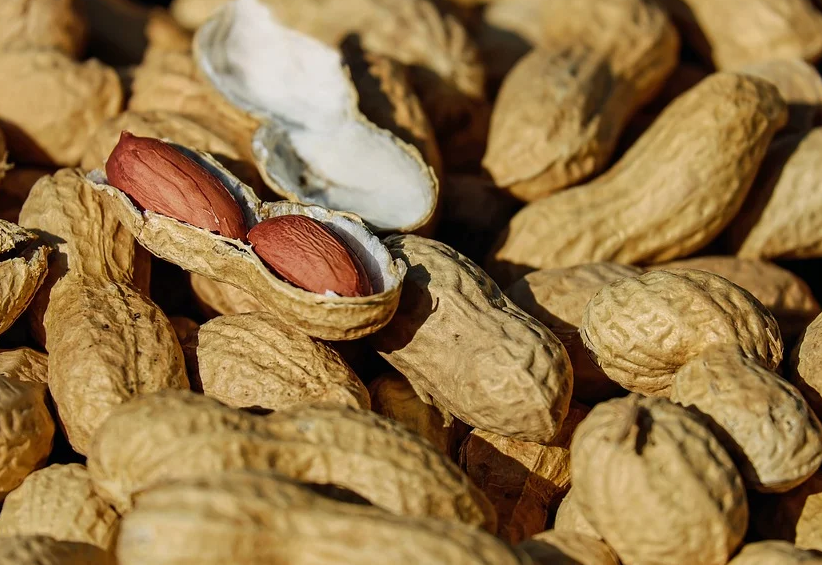
Cashew-nuts
Isn’t cashew nuts everyone’s favorite? Well, we like them. Do you know cashew nuts have a positive impact on your HDL levels? Easily available in India, cashew nuts can be found in almost every household.
The utmost famous recipe for cashews is Kaju ki barfi or as we call it “Kaju Katli”. During festivals, we all crave this sweet dish. You can prepare it at home too, adding very little sugar and making a healthy version of it. There are other variants of sweets available that are prepared from cashews. You can make a healthy nut mixture by adding mixed nuts and cashews. Moreover, can also use them in gravies and sauces to add that creamy texture to it!
Yet again to remind you, eat in limit and moderation. Let’s get started with the benefits of cashew nuts.
What are the benefits of cashew nut?
- Let’s start by understanding the nutrient content of cashews.
Cashews are rich in copper, and proteins. They are also energy-dense and low in carbohydrates. They contain good quality fats, i.e., unsaturated fatty acids. Apart from these, they are a rich source of magnesium, manganese, and zinc. Abundantly rich in selenium, iron, and thiamine. Well, isn’t it fascinating?
They are low in sugars and a decent source of fiber. So, might as well help in managing diabetes.
- They might help in brain function. Well, you read it right. As mentioned, cashews are rich source of copper. Copper is a micronutrient that helps in managing functions of brain and development.
- Cashews also aids in bone health. They are good source of magnesium and manganese which helps in maintenance of bone health and function.
- These nuts are also rich in antioxidants. As mentioned earlier in the article, anti-oxidative properties helps in preventing oxidation of cells via free radicals. So they have a protective effect. They contain carotenoids and polyphenols, which are the classes of anti-oxidants.
- Cashews might help in maintaining heart health. Some researches suggest that cashews have cholesterol lowering effect. But more research is needed in this area, as few suggest that they have no effect on cholesterol. That is neither positive nor negative.
- Diabetes prevention.
Cashew nuts might help in the management of diabetes. They are low in carbohydrates. In place of eating other snacks which are processed and high in sugars and salts and fats, it is better to munch on to healthy options.
What are the downsides of Cashew-nuts?
- they contain phytates. Phytates are such substances which hinders the absorption of vitamins and minerals.
- Roasted and processed cashews must be avoided. They are rich in salts and unhealthy fats. It is best to avoid them. You can dry roast them at home!
- Some people are also allergic to cashew nuts. So make sure to read the food labels properly before consuming the food item!
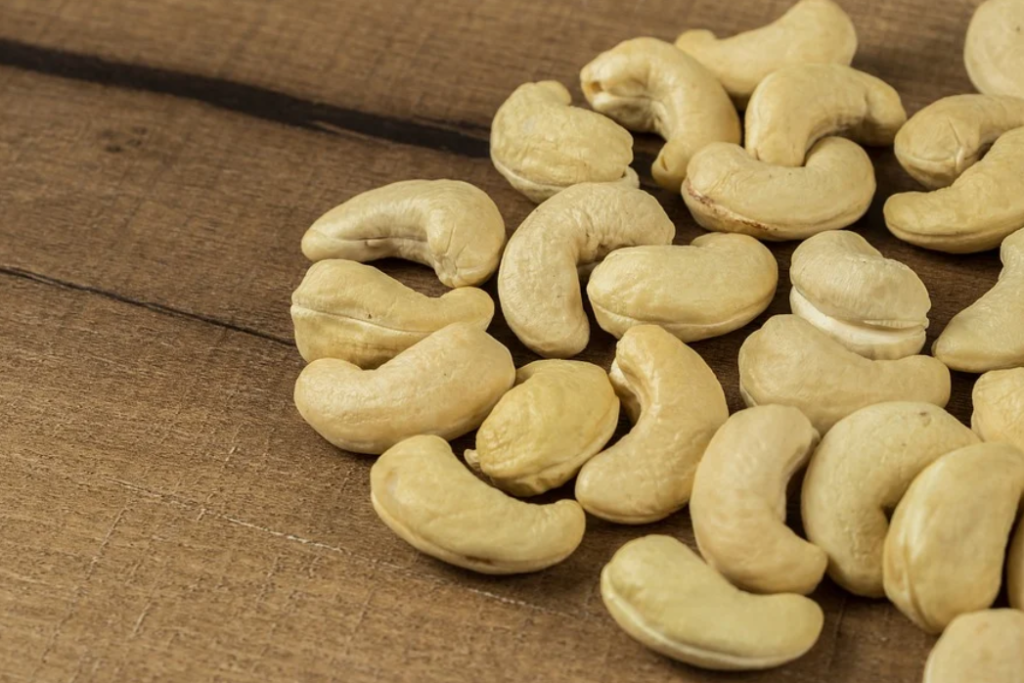
Pistachios
Pistachios generally come up with a hard shell, green in color with a salty taste. You can easily find pistachios in India, also known as pista. It is rich in nutrients and has anti-oxidant properties.
Pista or pistachios are generally used for garnishing on sweets. Have you ever tried pista burfi? Well, it is really delicious. Even on malpuas, you can find garnishing pistas. You can make a healthy nutty mixture by adding pistas. Or can add them in ice-creams, or pancakes, etc.
What are the benefits of pistachios?
- The most important benefit of pistachios is that they are super rich in nutrients. They are calorie dense with proteins and fiber. Contain low carbohydrates. Around 90% of the fat content found in pistachios is unsaturated fat. So you can yourself see the quality of fats present in pistachios.
They are a great source of thiamine, copper, Vitamin B6, and manganese. Also, a good source of potassium.
- Pista are rich in Vitamin B6. This vitamin helps in regulation of blood sugar levels, and also helps in the formation of hemoglobin.
- They are high in antioxidants, and therefore helps in prevention of oxidation of cells. By preventing oxidation, it may also prevent certain cancers. As the main risk factor of cancer is oxidation of cells via free radicals. Moreover, polyphenols and tocopherols are abundant in pistachios.
- Pistachios may aid in weight loss. They are high in fiber and protein and gives a sense of fullness when consumed. It might lead to satiation and you might not feel hungry often.
- They are rich in fiber. And fiber is very important for gut-microbiota. So, it might enhance and promote gut health!
- They might help in promoting heart health. Researches have suggest that pistachios may have a cholesterol lowering effect and this can promote heart health. Many studies have suggested that with a continuous intake of pistachios, LDL is reduced. Moreover, HDL increases and there is a reduction in the cholesterol ratio.
- As it is rich in potassium, it may also help in managing blood pressure.
One of the best things about pistachios is that they are really tasty to eat. Not only just tasty but they are so healthy. So, make that mixed nut mixture and consume all these nuts in moderation!

Seeds
Seeds or oilseeds are an integral part of our households. You can easily find sesame seeds, white or black, also known as “til” in houses. Mustard seeds are commonly available and used in many dishes. Flaxseeds or pumpkin seeds or chia seeds are also getting really famous. Do you know that there is a cycle of seeds that is really beneficial for PCOD or hormone balance?
Well, this cycle consists of flaxseeds, followed by pumpkin seeds, then sunflower seeds, and ends with sesame seeds. It starts on the first day of periods, and each seed is consumed for 1 week.
Coming back to seeds, let’s discuss them individually.
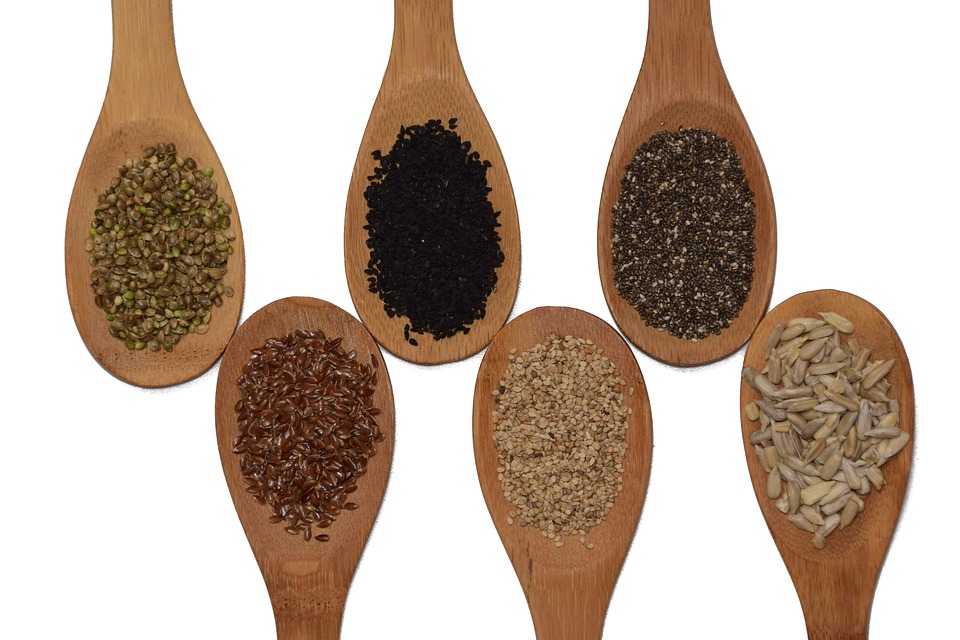
Mustard seeds(Oilseed)
Mustard seeds have varied functions and use in our life. They are abundantly used in our kitchen for tadka or added as condiments and spices. Adds flavor to the recipes. They are highly nutritious. Let’s see their benefits.
What are the benefits of mustard seeds?
- Mustard seeds are loaded with nutrients. They are rich in vitamins and minerals. Also, are a good source of protein and fiber. And are rich in unsaturated fatty acids.
- They are a great source of calcium. Aiding in our bone health.
- Also, they are rich in iron. Iron when eaten with vitamin C, enhances absorption of iron. So next time when you have an iron-rich diet, make sure to have something citrus, vitamin C rich. This will enhance absorption of iron, and will help in filling your iron stores.
- Mustard seeds are a rich source of potassium and contain low sodium. Therefore, they might aid in managing blood pressure.
- They are rich in magnesium and phosphorus. In addition to promote bone health, they also helps in promoting nerve transmission and function.
- Mustard seeds are rich in anti-oxidants. Rich in selenium and zinc. They might help in preventing oxidation.
- These seeds might also help in managing heart disease by having a cholesterol lowering effect.

Sunflower seeds(Oilseed)
Sunflower seeds are loaded with nutrients. They are rich in proteins and fiber. And also are abundantly available in India. These seeds have antioxidant properties and are rich in healthy fats.
Sunflower seeds are covered in black and white shells, but from inside they are white. You can consume them raw as such or can include them in a healthy seed mixture or in your recipes. Let’s discuss their benefits in detail:
What are the benefits of sunflower seeds?
- Sunflower seeds are rich in Vitamin E and polyphenols. And they really help in reducing inflammation. Inflammation is really dangerous for body and may lead to chronic disorders. It may also lead to auto-immune disorders.
- Sunflower seeds are said to be heart healthy. Many researches suggest that these seeds have cholesterol lowering effect.
- They are rich in selenium and zinc. Both of these minerals aids in boosting the immune system. So overall, consumption of sunflower seeds may improve immune function.
- Rich in phosphorus, calcium and magnesium, they correspond in supporting bone and teeth health.
- This seeds are high in potassium and low in sodium and therefore, they might help in managing blood pressure.

Flaxseeds(Oilseed)
Flaxseeds are a great source of nutrients. They are a rich source of omega-3 fats and also a good source of fiber. These days, flaxseeds have become famous and are considered as superfoods too.
You can have them raw or can add them to your recipes to make them more wholesome and full-filling.
Let’s discuss the benefits of flaxseeds:
What are the benefits of flaxseeds?
Source of Nutrients
- Flaxseeds are rich in nutrients. they are rich in proteins, fiber and polyunsaturated fatty acids. Vitamin B1, and B6, and folate and calcium. Moreover, rich in iron, magnesium and phosphorus as well as potassium.
- They are an amazing source of omega-3 fatty acids. Which makes them heart healthy and also suggests that they reduce the chances of stroke.
- This seed is rich in anti-oxidants, and researches suggests and they may help in prevention of cancer.
- They help in managing diabetes as well as blood pressure. And are a good source of dietary fiber and therefore, not only promote gut health but also helps in managing diabetes.
- Flaxseeds are wholesome and provide satiety. This helps in keeping a check on hunger. Researches suggest that they may help in weight loss.
Serving of flaxseeds: 1 tablespoon of seeds per day. You can add them to your salads or dressings or can have them raw!
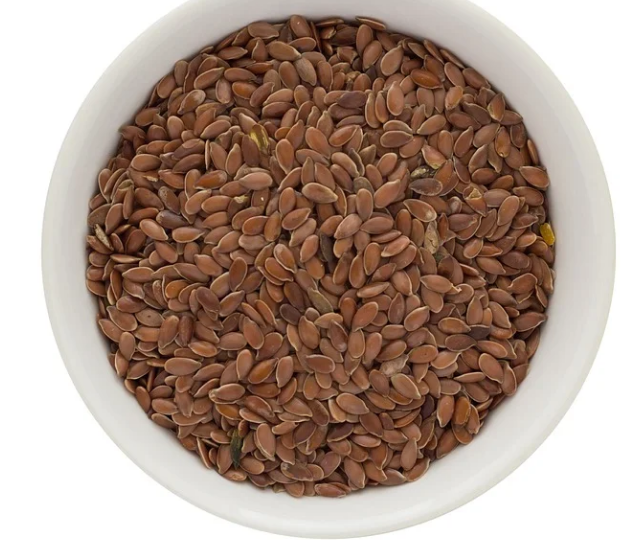
Chia seeds(Oilseed)
Another seed that is extremely rich in nutrients is Chia Seeds! These are also considered superfoods and people are consuming them daily as a part of their daily routine. The best part about chia seeds is that they can be used and incorporated into the diet very easily. You can add them to your smoothie, or puddings or frozen fruit bowls, or can use them for garnishing. And the list goes on and on.
What are the benefits of Chia seeds?
- Firstly, let’s discuss the nutrition facts of these amazing seeds.
they are a good source of proteins and rich in fiber. Also, they contain ALA (alpha-linolenic acids) which is an essential amino acid. Do you know that they are brimming with Calcium? Well, not only do they provide calcium, these seeds are rich in iron, magnesium, and phosphorus.
Also, high in zinc and thiamine, and niacin!
Isn’t it great?
- Well, did I mention that they are rich in anti-oxidants too? They are loaded with anti-oxidants which will prevent your cells from oxidation.
- Chia seeds may aid in weight loss. The primary reason behind this is that they are high in fiber and proteins. They produce a sense of satiety and you feel more fuller. When this happens, you might refuse to eat more and hence reduce your calorie intake!
- These seeds have a cholesterol lowering effect and therefore they might promote heart health and also help in managing blood pressure.
- They are rich in calcium and magnesium and phosphorus. These minerals are really important for your bone health. So, Chia seeds may promote bone health too.
- Chia seeds may also help in regulating blood sugars levels, most probably due to their fiber content.
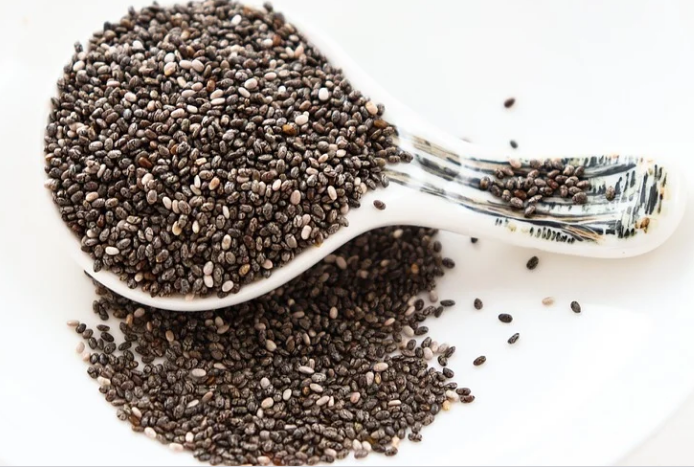
Sesame seeds (Oilseeds)
Have you ever come across the white or black seeds in your house? They are very small in size and available in white or black color. Most commonly called as “til” in India, sesame seeds are easily available in every part of the country.
There are many dishes that can be made from these seeds. One such sweet is til ke ladoo. Well, let me tell you, I am very fond of these ladoos. You can make them with jaggery too. Nutrient and energy dense ladoos, and above that, they are so full-filling. You must have also seen garnishing of sesame seeds on chilly potato or other food items. So, yes, you can use them as garnishing as well.
What are the benefits of sesame seeds?
- They are rich source of many nutrients that are required by our body on daily basis. Such as zinc, iron, calcium and potassium.
- Sesame seeds are goof source of fiber. And therefore, research suggests that they might be helpful in controlling diabetes.
- Did I tell you that they are heart healthy as well? Sesame seeds are known for their cholesterol lowering effect and may aid in HDL cholesterol. So, they might promote heart health.
- Abundant in Proteins. As a plant source, sesame seeds are a really good option for proteins. And they are easy to incorporate in diet as well.
- Sesame seeds are high in calcium, magnesium and zinc. These all nutrients are good for your bones. So, these seeds might improve or promote bone health.

If you are struggling shedding weight. You can talk to us by taking this assessment: Click here
For more information click here

